Picture this – it’s a hot Saturday afternoon in July, and you’ve found yourself down on your knees in your garden, wiping sweat from your brow as you make your way into your third straight hour of pulling weeds.
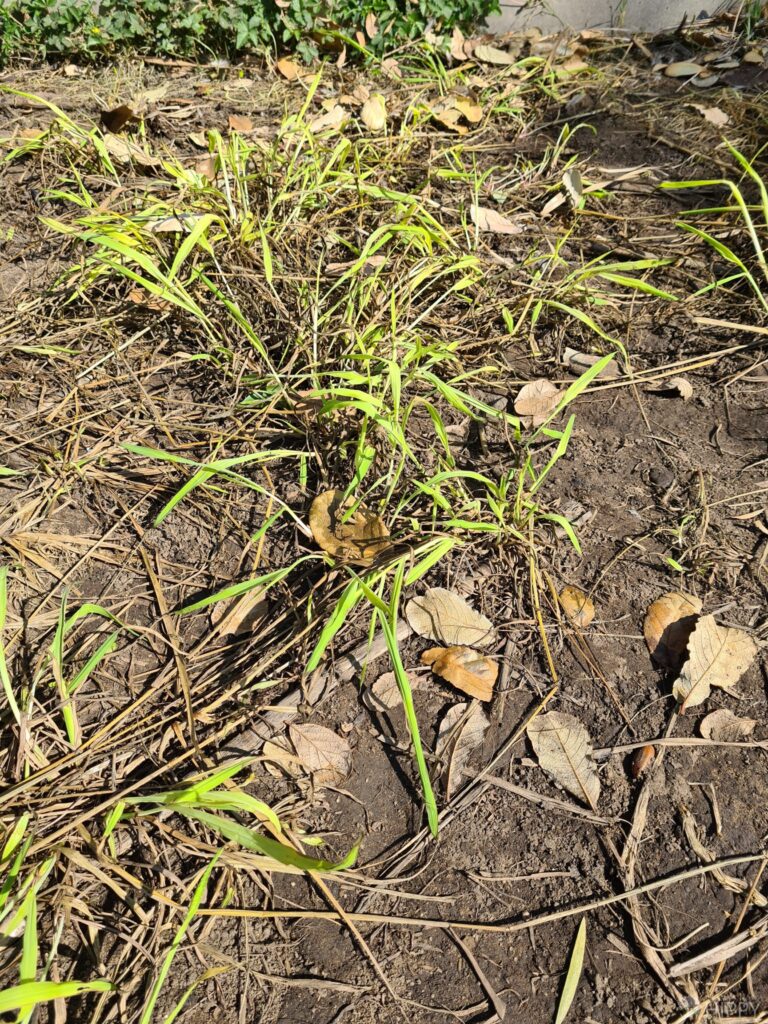
“Is it even worth it?” you ask yourself as you reach for your trowel yet again.
You might be wondering, in this moment of duress, if garden weeds are even really that bad.
And the short answer to that question might surprise you…
Before we can answer the question of whether garden weeds are really that bad, we need to decide what weed actually is.
Table of Contents
What is a Weed?
Simply put, a weed is a plant that is growing somewhere it is not ultimately wanted. Often, this is in competition with the plants that you have cultivated.
By this definition, a weed could be a tomato plant growing in your strawberry patch…
Weeds also grow in a certain manner that allows them to be fast and invasive. Some weeds are strong competitors naturally – out of the 250,000 species of plants around the world, only about 3% behave as weeds.
These plants have certain characteristics that allow them to thrive. For instance, they produce abundant quantities of seeds. They establish themselves quickly and are able to survive in the long-term.
You may notice that your weed seeds go dormant, but then sprout right back up as soon as conditions are favorable again.
Are Weeds Bad?
Yes, weeds are bad, because they can attract unwanted pests and carry diseases. But, some weeds can be good because they might attract good bugs, repel bad ones, and even help and protect wildlife.
Weeds usually perform some vital ecological function, working to fix a wrong that, often, we were the ones who have created it.
Weeds can prevent erosion, break up compacted soil, mine minerals, cover bare ground, or even fertile depleted soils.
In short, a weed doesn’t show up for no reason. There are many weeds that are considered not just functional, but necessary for your garden’s health. Here are some examples of how weeds can help you improve the health of your garden.
What Problems Do Weeds Pose?
Weeds are known for their ability to give gardeners all kinds of headaches and stress. They do this in a variety of ways…
Reduced Crop Yield
The first way is by reducing crop yield. If you have a ton of weeds, your cultivated plants aren’t going to be able to compete as well for space, nutrients, light, and water.
Can Cause Rashes and Allergic Reactions
Some weeds, particularly invasive weeds, are not just unpleasant to look at in the garden, but can also be harmful. These are the weeds that you may want to consider mowing down or even killing with herbicides – there’s not really any good reason to keep them in the garden.
Examples include things like poison hemlock, poison ivy, and poison parsnip. These weeds are going to cause major problems for you – so get rid of them.
Using Up Vital Nutrients, Sunlight, and Other Resources
Most notably, weeds compete with your plants for resources such as sunlight and water.
This means that while the weeds are thriving and growing fast due to the nutrients available in your soil, your own carefully cultivated plants may be struggling because they don’t have enough nutrients to survive.
Canada thistle and bindweed are both examples of plants that will rapidly overtake your garden beds and make it hard for anything else to grow. Put on a pair of gloves and yank these weeds out ASAP – they will definitely do more harm than good.
Releasing Allelopathic Chemicals
Other weeds produce chemical substances that are toxic to your crop plants – and sometimes to you or other animals.
Attracting Bad Bugs, Pests, and Predators
Weeds are like magnets for bad bugs and pests. Insects such as aphids, slugs, and caterpillars love to make their homes in weedy areas.
These bugs feast on the plants in your garden, leaving behind damaged leaves and stems. And if they get too numerous, they can even kill off entire plants!
Weeds also attract plant predators—namely animals like rabbits, deer, and squirrels.
These critters may not seem so dangerous at first glance, but when left unchecked they can do a great deal of damage to your plants by nibbling away at their leaves or tearing out entire root systems.
And unfortunately, once these animals establish themselves in your garden space it can be difficult to get rid of them!
Unpleasant to Look At
Weeds also make your garden look unsightly – at least, most weeds, and most gardens, anyway. If you’re a gardener, you’ve probably spent a great deal of your time pulling weeds or looking up ways to make your weeds go away.
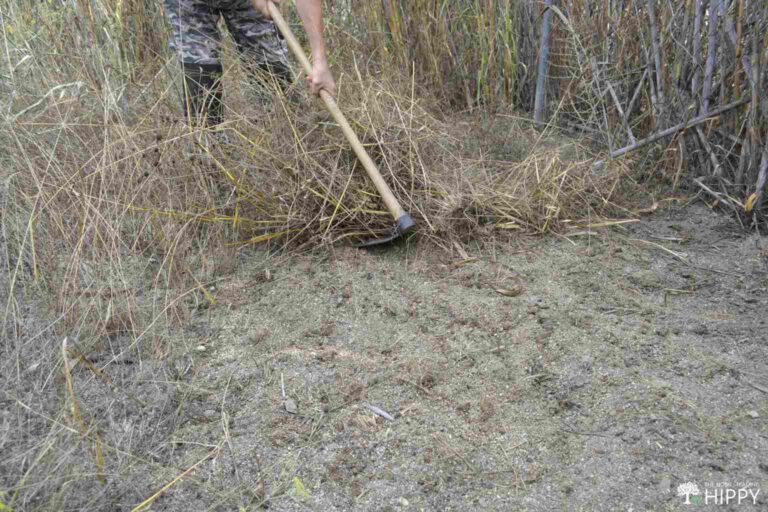
Benefits of Having Weeds in Your Garden
Attract Beneficial Insects
Having a weedy lawn or garden might frustrate you, but it’s not going to stress out anybody else. Certain weeds, like clover, dandelion, and plantain, are favorite foods for important pollinators like the Baltimore Butterfly and the Eastern tailed blue butterfly.
By allowing some of these weeds to grow in your garden, you encourage butterflies to lay eggs there. This can result in more butterflies later on, which can help you pollinate your garden.
Other insects, like predatory wasps that eat pests, ladybugs, and even bees can be attracted to the weeds in your lawn. “Good” insects like these can help keep the populations of “bad” ones down.
You’ll be able to spend less time and money battling pests on your plants – so in essence, it’s a trade-off.
Repel Harmful Insects
With that last point made, it’s important to note that some weeds actually have the power to repel harmful insects. By letting certain weeds in your lawn grow, you can repel harmful insects from your plants.
Plants like dandelions can deter armyworms, while lamb’s quarters can keep leaf miners and Japanese beetles away.
Offer Safe Haven
There are some weeds you won’t want to grow near your cultivated plants because they will draw in creatures like birds and deer to munch on your garden. However, there are some weeds that are crucial for wildlife preservation.
Birds often use the fibers and bark from weeds to build their nests. Weeds can provide cover for wildlife, offering a shelter in which they can hide from predators.
Prevent Soil Erosion
Weeds can prevent erosion of the topsoil on your property, particularly if you live in a place with poor soil or soil that is prone to drought.
Weeds are often the most resilient plants in an area and will survive long after the other planets have been killed by a lack of water.
Weeds can hold down the topsoil (thereby holding down the fort, so to speak) until the ground has enough moisture for your other plants to return.
Dredge Up Nutrients
There are plenty of weeds, like spiny sow thistle, dandelions, cockleburs, wild amaranths, Queen Anne’s lace, and more, that have strong roots that drill deep into that around.
These weeds, which have exceptionally deep taproots, can help your garden because they break up hard, compacted soil and draw up nutrients from places that weeds are usually unable to reach.
If your weeds are composted or turned back into the soil later on, these nutrients will then be available for other plants to use. They can also pull moisture upward and outside of the roots for other plants to benefit.
Some weeds, like mugwort, can even absorb heavy metals from the ground and add their own special nutrients to the soil.
Top Beneficial Weeds
White Clover
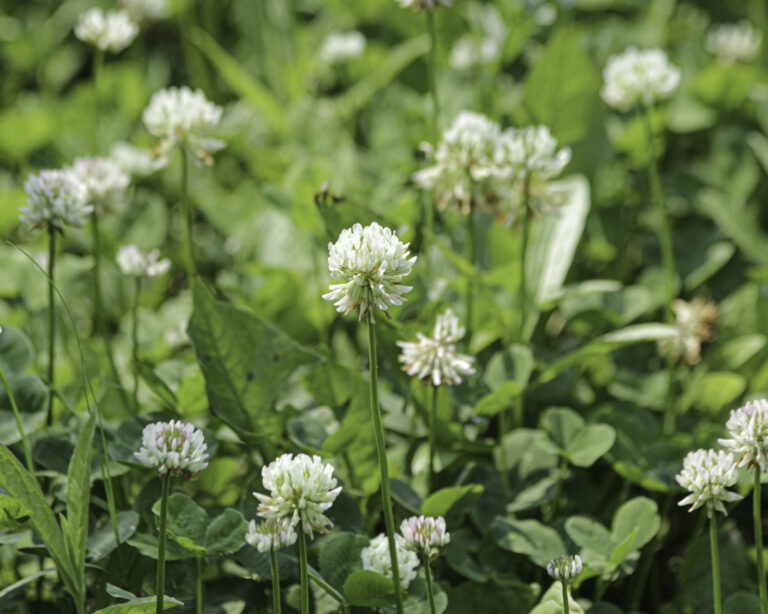
Clover is best grown near brassicas, like cabbage and broccoli, but is really beneficial no matter where you choose to grow it.
It has flowers that attract pollinators and can be used for culinary and medicinal benefits, too. Just don’t grow it near tomatoes, as it makes the soil too fertile – tomatoes need a bit of a mild nitrogen deficit to set fruit.
Wild Blackberry
Wild blackberries attract predatory insects, and the berries are safe to eat.
Comfrey
Comfrey is a weed with deep-tapping roots. It can help mine minerals that are beneath the soil surface and make them available for nearby or future plants.
Joe-Pye Weed
This plant provides habitat for predatory insects and pollinators.
Motherwort
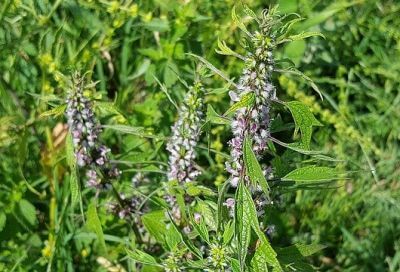
Motherwort attracts bees.
Plantain
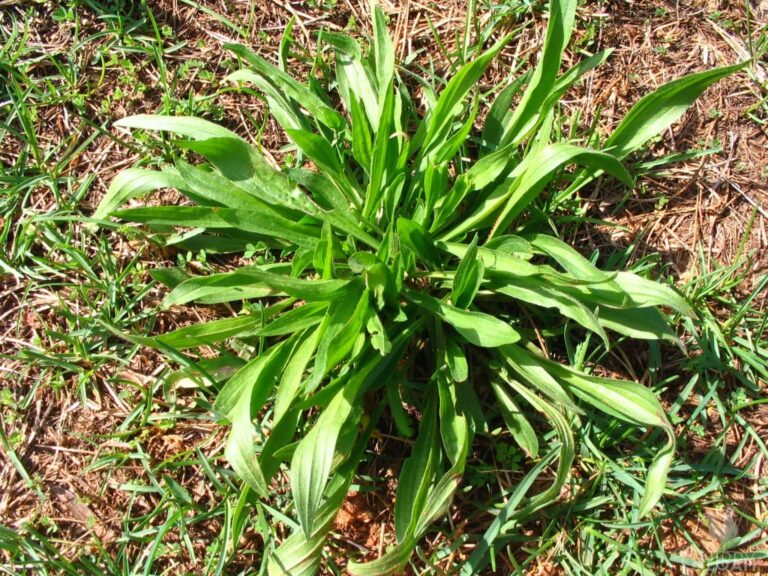
Plantain is a hardy perennial that reproduces by seed. It usually is found on lawns, so it’s not going to compete with your vegetable crops.
You can pull it from your garden by hand, if it’s really bothering you – but don’t throw it out. You can use it in the kitchen, where it tastes great raw or steamed, or for medicinal purposes.
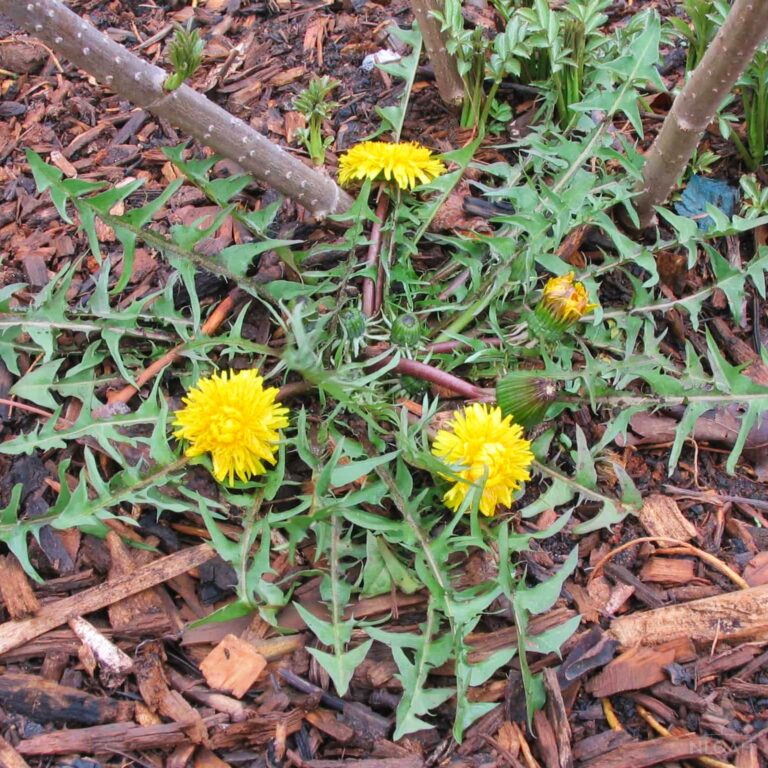
Dandelion
Dandelions are some of the most beneficial garden “weeds” you can grow. Not only do they attract pollinators, but they are edible, providing many medicinal benefits.
Lambsquarter
Lambsquarter is really not a problem in your garden unless you are growing plants that tend to compete with it, such as lentils, chickpeas, sugar bets, and similar crops.
If you’re willing to tolerate it, it’s worth keeping around – it tastes fantastic when you harvest it and saute it just like spinach.
Most Weedy Grasses
If you find grass growing that you didn’t necessarily plant, in most cases, you can leave it be -most normal grasses can be used as ground cover and are particularly effective in nitrogenous soils.
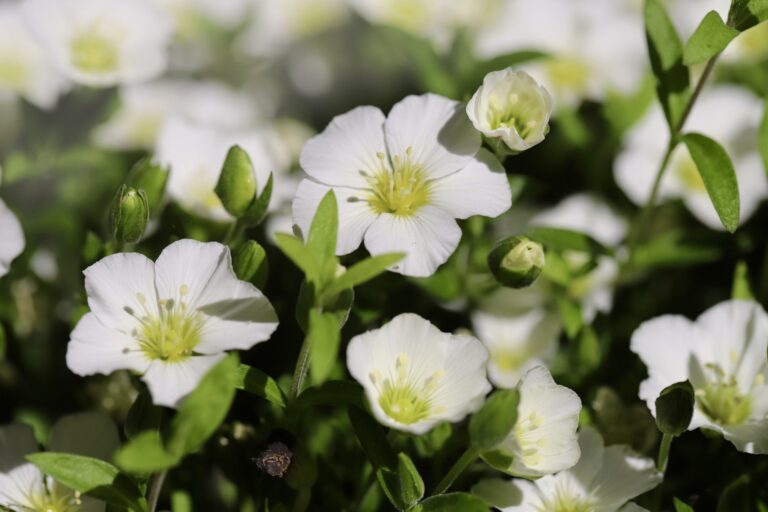
Chickweed
Chickweed shows up in disturbed soil, particularly soil with low fertility. It will help accumulate phosphorus and potassium and also attract beneficial insects – particularly pollinators.
Nettle
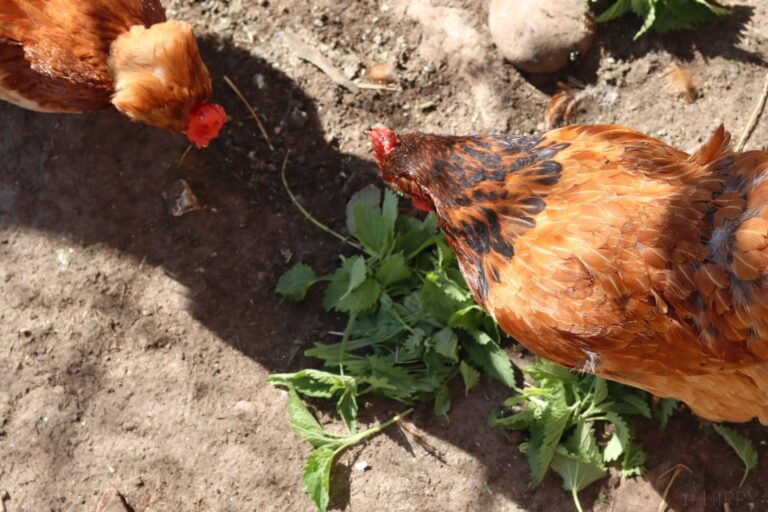
Nettle is a great companion plant for broccoli, fennel, tomato, and mint. It is also edible and was once grown as a crop for its fibers, used in the place of rennet for cheesemaking.
Caper Spurge
This weed is poisonous to humans but can be eaten by many domesticated animals. It was also used in folk medicine as a purgative agent.
Wild Mustard
Wild mustard is an excellent companion plant for brassicas like cabbage, broccoli, and cauliflower. It attracts ladybugs, and repels brassica pests like aphids.
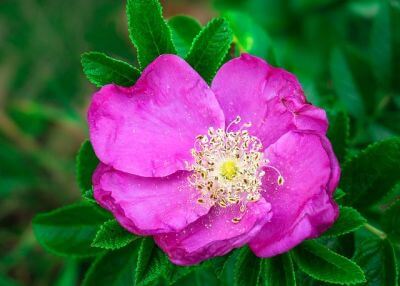
Wild Rose
Wild roses should be grown near cultivated roses, grapes, and strawberries. It keeps away rodents, deer, and Japanese beetles. Plus, you can use the hips for herbal teas!
Pigweed
Pigweed is another edible weed that tastes great when harvested young and tender. It is not too harmful to have around your other vegetable crops. Unless you’re growing broadleaf plants like cotton and soybeans, it’s not going to cause a lot of problems.
Pigweed is packed full of vitamins. It’s as nutritionally dense as beets and carrots. and tastes fantastic in a salad.
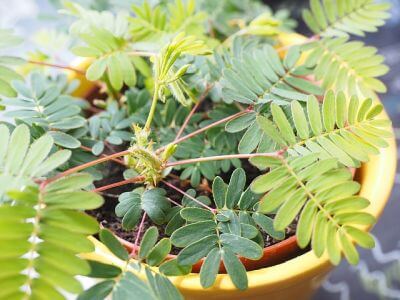
Bashful Mimosa
This plant serves as a good ground cover for plants like tomatoes and peppers, and it also attracts predatory beetles.
How to Use Weeds
Rather than spending all of your time stressing about the weeds in your garden and wondering how you can remove them, consider, instead, how you can use them to your advantage.
The presence of weeds often indicates that there are ways you can improve your garden – this could be through supplying a deficient nutrient, balancing the soil pH, or something else.
Instead of looking at weeds as a need to purge, look at weeds as a need to meet some other deficiency. Many permaculture systems have used weeds to fill certain purposes in the gardens.
Leguminous weeds, like Russian olives and vetches, are often viewed negatively but can instead be used to repair a damaged landscape by fixing nitrogen.
Here are some tips on how to use weeds in the garden.
Don’t Let Them Set Seed
If you have certain weeds that you’d rather not see in your garden, just make sure they don’t set seed. It can take a few years to totally get rid of weeds, because seeds last for so long.
Certain plants, like purslane and chickweed have super-tiny seeds that can be blown by the wind over short distances, too.
Turn Them In
If you have a garden that’s not actively being used to grow plants but is instead getting covered in weeds, don’t despair – instead, think of the weeds as a free cover crop.
There are some plants you’ll want to get out for sure- like poison ivy, which is going to do more harm than good. However, if you have plants like purslane or chickweed hanging out while you wait to plant, use them for the greater good.
These plants can hold down topsoil, preventing it from being eroded or blown away while the earth is fallow. When you’re ready to plant, simply cut the plants down or compost them (make sure you do this before they’ve gone to seed).
In some cases, you may be able to just turn them into the soil afterward. This will add beneficial nutrients to your soil, giving you a two-for-one benefit in your garden.
Use Them to Mine for Water and Nutrients
Weeds were around long before humans were, and they have an innate ability to find water and fertilizer. To make the most of weeds, don’t disturb an inactive plot of the garden filled with groundbreaking weeds, like Queen Anne’s lace or cockleburs.
If you need to plant, allow a deep-reaching weed to remain every ten or so feet among your crops. This will help open up the hardpan in your soil.
Not only will your cultivated plants have an easier job of reaching underground water reserves and nutrients, but their roots will already have a path blazed for them through the hard soil.
Use Them As Mulch
Some perennial weeds and annual weeds can also be chopped and used as mulch.
Just like you might use grass clippings as mulch to help prevent soil erosion and ensure good soil moisture, these weeds can also be chopped and left lying in the garden to serve as a mulch and suppress future, harmful weeds.
Read Weeds as a Compass
A weed can give you a lot of information about a chunk of land. It can tell you what’s going on underground, for instance. If you’re considering breaking ground for a new section of your garden, look at the weeds that are already growing there.
Monitor the growth of three or four weeds, and then look up what kinds of soil conditions those weeds prefer to grow in.
If you see weeds like sow thistle or lambs quarter, for instance, you’re in luck! These weeds love growing in rich, fertile soil – indicates that this plot could be the perfect location in which to dig your next garden.
If You Can’t Beat ‘Em, Eat ‘Em
Worst-case scenario – or perhaps best? – you can always eat the weeds that are causing your stress. Lambsquarter is delicious and nutritious and is actually grown in some places as an edible crop.
Purslane, another tasty weed, is a fantastic source of omega-3 fatty acids. Chickweed and wild onions can also provide terrific fodder for the dinner table.
Even if you decide that your garden weeds are too unpalatable to be served at lunchtime, know that many weeds have medicinal benefits.
Jewelweed, for example, has been used by Native Americans and herbalists for years as a remedy for bee stings, rashes, mosquito bites, and even poison ivy.
You can even use weeds for crafts, including them in fresh or dried arrangements, botanical art, or potpourri!
Just make sure you know what exactly you’re using. Some weeds have toxic look-alikes, while others have harmful qualities that you should avoid.
For instance, sorrel can be eaten in small amounts, but contains tons of oxalic acid, just like Swiss chard. Eating too much sorrel can cause kidney damage.
Why You Need Weeds
Sure, weeds popping up all over the place in your vegetable garden might not be all that attractive to look at. But don’t let them stress you out!
There are plenty of benefits to keeping weeds in the garden, and instead of tearing your hair out while you’re trying to tear out all of the weeds, consider tapping into these benefits to make your garden as healthy as possible.
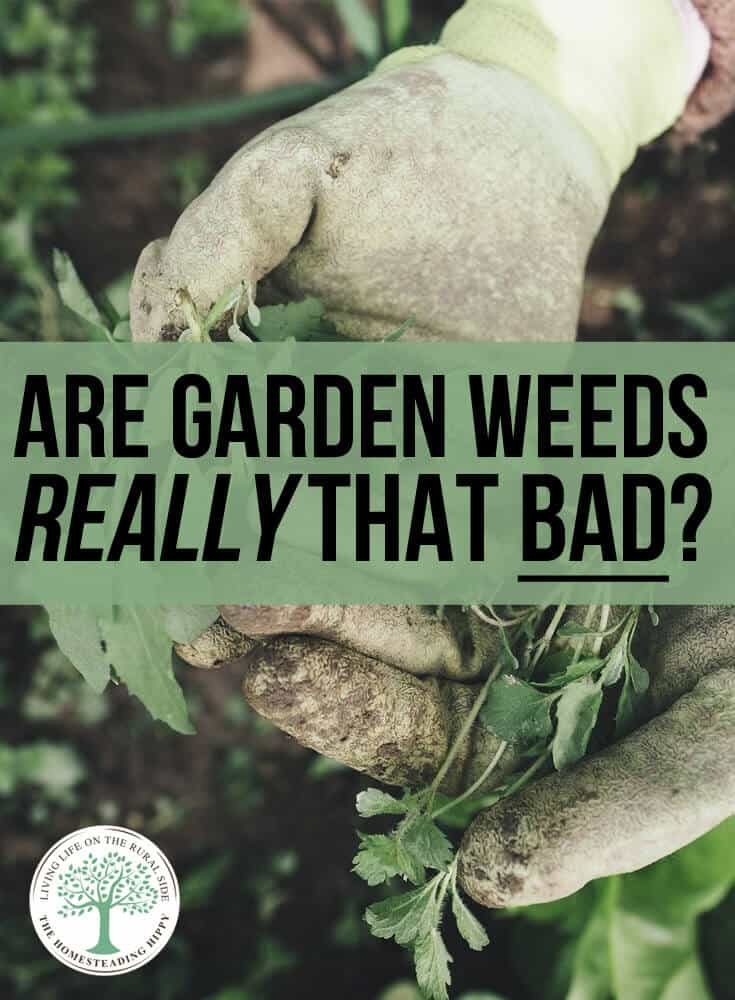

Rebekah is a full-time homesteader. On her 22 acres, she raises chickens, sheep, and bees, not to mention she grows a wide variety of veggies. She has a huge greenhouse and does lots of DIY projects with her husband in her ever-growing homesteading endeavor. Learn more about Rebekah here.

Thank You this article was a enjoyable and informative read.